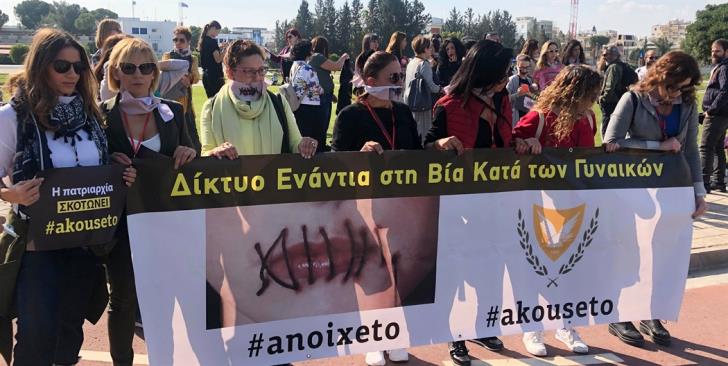Rape victims in Cyprus lack enough support, despite positive steps taken by Cypriot authorities, according to the first evaluation of Cyprus by the Council of Europe’s Group of Experts on Action against Violence against Women and Domestic Violence (GREVIO).
GREVIO’s report which was published on Wednesday criticises the dearth of comprehensive support for rape victims in the country.
In particular, GREVIO notes that specific counselling and comprehensive assistance for victims of female genital mutilation (FGM), forced marriage or rape are lacking, resulting in a serious gap that should be closed. Rape victims residing outside Nicosia “are especially vulnerable and lack support,” the report notes.
Support for 1974 sexual violence victims
GREVIO’s findings address the “legacies” of sexual violence, referring specifically to the victims of conflict-related sexual violence in 1974. The report stresses the need for specific counselling services to address long-term trauma and suffering.
Increased risk for migrant and asylum-seeking women
GREVIO also highlights the “accrued risk” of migrant and asylum-seeking women victims of sexual violence and rape, referring to civil society reports on landlords exploiting the precarious situation of asylum-seeking women and their desperate need for lodgings. Moreover, asylum-seeking, and migrant women face difficulties to report gender-based violence and obtain support, the report found.
Patriarchal prejudice can affect reporting, processing cases
GREVIO also criticises the prejudices and patriarchal attitudes prevalent in authorities, which can lead to the misrecording of incidences of violence against women and police inaction.
The report finds moreover that some judges and prosecutors have displayed sexist and misogynist attitudes towards victims, reflecting an inadequate understanding of the paradigm shift in proving rape following the amendment to the law defining the sexual offence.
Another important concern raised is how forensic evidence to help victims can only be taken on by a forensic expert, provided the victim reports the offence to the police: this deprives victims who do not feel ready to report violence to the police of the ability to produce strong evidence and thereby obtain justice, should a victim change her mind at a later time and want to report the crime. Furthermore, only four forensic experts, who are responsible for taking evidence in respect of all types of crimes, are available in the entire country.
Despite a revision process underway for custody and visitation rights, both the law and court practice do not ensure that domestic violence incidents or other forms of violence against women are considered in reaching a final decision, the report says. Nothing indicates that family courts inquire into existing risk assessments made by law-enforcement officers or social welfare staff, with a view to taking them into account and determining the best interests of the child, or whether the courts check if criminal proceedings are pending against the abusive parent or have been brought in the past.
Steps forward
The first evaluation of Cyprus by the Council of Europe’s Group of Experts on Action against Violence against Women and Domestic Violence (GREVIO) highlights positive steps by Cypriot authorities taken since ratification in 2017 of the Council of Europe Convention on Preventing and Combating Violence Against Women and Domestic Violence (Istanbul Convention).
GREVIO, which monitors treaty implementation, welcomes, for example, Law 115(1)/2021, which criminalises many forms of violence against women. Furthermore, amendments made to the definition of rape to align it more closely to the treaty – “no means no” – also are lauded by GREVIO, as is the entry into force of a 2021 anti-harassment and stalking law and a 2020 law against sexism.
Based on a visit to Cyprus earlier this year, the report moreover praises the recent opening of the Women’s House in Nicosia, a crisis centre that offers domestic violence victims a complete range of support services, 24 hours a day, seven days a week.
Recommendations
Among report recommendations, GREVIO urges the Cypriot authorities to:
- Set up rape crisis or sexual violence referral centres and provide medical and forensic examinations, trauma support and psychological counselling for victims.
- Amend the Law on Parents and Children Relations and issue guidelines for practitioners to explicitly provide and ensure that in the determination of custody and visitation rights of children, incidents of violence covered by the Istanbul Convention are taken into account and, in addition, to ensure that in the exercise of any visitation or custody rights, the rights and safety of the victim and her children are safeguarded.
- Put into place a clear legal framework governing restraining orders in cases of domestic violence, avoiding any overlaps between applicable provisions, while ensuring that restraining orders are available to victims for immediate protection, without high evidentiary requirements or other burdens placed on the victim
- Ensure that emergency barring orders in cases of domestic violence can be issued quickly, in situations of immediate danger without lengthy proceedings and with specified and stringent time limits for their request and approval.
- Take legislative or other measures to qualify with more precision the concept of consent in the context of the rape and sexual violence offences criminalised by the Criminal Code, clarifying that it should be given voluntarily as the result of the person’s free will, assessed in the context of the surrounding circumstances.
- Provide newly established specialist investigative units on domestic violence with the training, guidance and the expertise to handle other cases of violence against women, beyond domestic violence, such as stalking, digital forms of violence against women, sexual harassment, FGM, forced marriage and rape.
- Ensure that standard operating procedures are developed to identify and protect asylum-seeking women and girl victims of gender-based violence and ensure that they are screened for such vulnerabilities upon arrival (or swiftly after), ensuring prompt transfer to reception facilities or private accommodation and access to support services and counselling.






